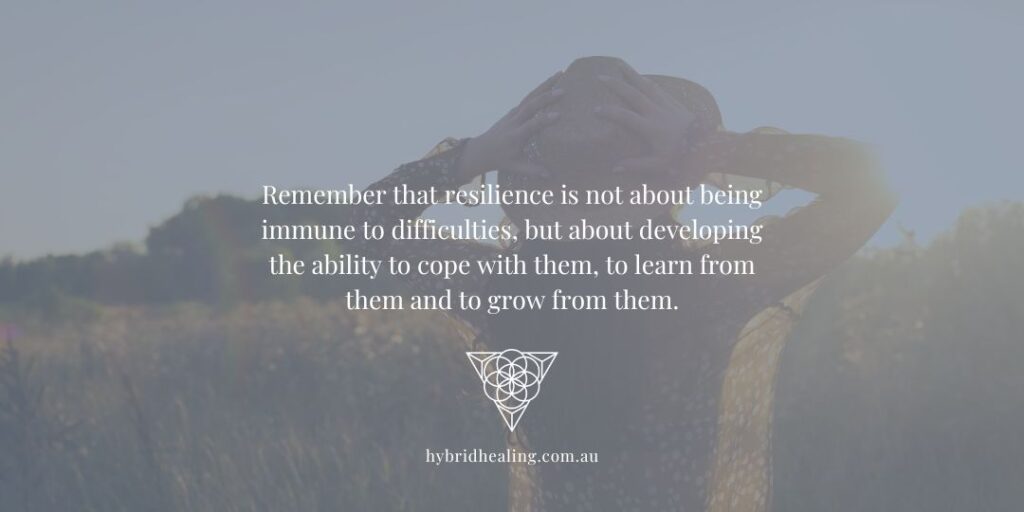
Resilience refers to the ability to bounce back from adversity, to adapt and cope with difficult situations, and to maintain a positive outlook despite challenges. The ability to keep going under immense pressure, moving forward even in the face of set back after set back. It is an important trait to have in life, as we all face difficult situations and setbacks at some point.
The adversity that we face is our training ground for resilience, it builds as we go through our experiences. Resilience provides us with courage to face what comes our way, it builds strengths of character, it makes us strong.
We may fear what comes our way, but by walking through it we build our ability to handle it and therefore creating resilience.
Life sends us many challenges there is no doubt about that. Resilience is the difference between continuing on in the face of adversity or running and hiding and not giving our all to life, therefore not realising our potential.
Resilience is showing up day after day, trying over and over again with sometimes no improvement, one step forward or two steps back with a commitment to the long haul.
It requires consistency and grit. The journey can be treacherous and unforgiving yet we just continue on.
That is what warriors are made of, and the difference between those who succeed and continue to provide results over those who don’t.
The same two individuals can experience the same adversities, yet one can flourish and one does not. The difference is the commitment to the journey in the face of it all, essentially, resilience at its finest.
Resilience is what we all have within us if we just have the consistency to follow through, pushing on without giving up is all we need to succeed. It’s just like a muscle, we need to build it.
If you look at many of the greats and their stories of resilience, for example, Albert Einstein, Victor Frankle, Nelsen Mandella, Charlize Theron, Michael Jordan, Tony Robbins and so many more, they all have experienced extreme circumstances yet flourished in the face of adversity, turning their experiences into something great. The main characteristic in each and every one of these greats is resilience.
Here are some tips to help you develop resilience:
Practice mindfulness: Mindfulness is the practice of being present and non-judgmental, and it can help you to stay calm and focused during difficult situations. This can help you to better understand your thoughts and emotions and respond to them in a healthy way.
Build a support system: Surround yourself with friends and family who care about you, and who you can rely on for support and encouragement. Having a solid support system can help you to feel less alone during difficult times.
Learn from setbacks: Instead of dwelling on mistakes or setbacks, try to learn from them. Reflect on what you can do differently next time, and think about how you can grow and improve as a result of the experience.
Take care of yourself: Resilience requires physical, emotional and mental well-being, so make sure you are eating well, getting enough sleep, and engaging in regular exercise.
Find meaning in difficult situations: When facing a difficult situation, try to find meaning in it. This can help you to understand the purpose of the challenge, and to find a way to move forward.
Practice gratitude: Focusing on what you’re grateful for can help you to put things in perspective and to appreciate the good things in your life, even when things are tough.
Seek professional help: If you feel like you’re struggling to cope with a difficult situation, don’t be afraid to seek professional help. A therapist or counsellor can help you to develop the skills you need to build resilience and to cope with adversity.
Recent research and studies on resilience have highlighted the importance of positive thinking, social support, and a growth mindset in building resilience. Studies have shown that individuals who have a positive outlook on life, who have a strong support system and are able to adapt to change have a greater ability to cope with stress and bounce back from adversity. Research also suggests that building resilience skills such as problem-solving, self-care, and stress management can help individuals develop the ability to cope with challenges and adversity. Additionally, studies have also shown that mindfulness and mindfulness-based interventions can be effective in promoting resilience by reducing stress and improving emotional regulation. Overall, the latest research and studies on resilience emphasize the importance of developing a combination of cognitive, emotional, and behavioural skills to build the capacity to cope with challenges and bounce back from adversity.
Remember that resilience is not about being immune to difficulties, but about developing the ability to cope with them, to learn from them and to grow from them.
Let’s all focus on just showing up everyday our absolute best regardless of what’s going on around us, we owe it to ourselves and our lives.
Warm regards
Loretta 🖤

Recent Comments